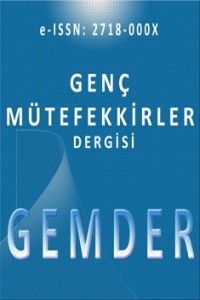Patočka Felsefesinde “Kriz” Düşüncesi Üzerine
kriz, polemos, khorismos, sarsılmışların dayanışması, epokhe, fenomenoloji.
On the Concept of “Crisis” in Patočka Philosophy
crisis, polemos, khorismos, solidarity of the shaken, epokhe, phenomenology.,
___
- Akdeniz, Emrah. “Nietzsche’de Dekadans Ve Kültür Eleştirisi Olarak Trajik Bilgelik”, FLSF 15, (2013), 111-126.
- Buckley, R. Philip. Husserl, Heidegger And The Crisis Of Philosophical Responsibility, Dordrecht: Springer, 1992.
- Husserl, Edmund. “The Vienna Lecture”. The Crisis of European Sciences and Transcendental Phenomenology. trans. by: David Carr. Evanston: Northwestern University Press, 1970.
- Husserl, Edmund. Kesin Bilim Olarak Felsefe. ter: Abdullah Kaygı, Ankara: TFK Yayınları, 2007.
- Husserl, Edmund. The Crisis of European Sciences and Transcendental Phenomenology. trans. by: David Carr. Evanston: Northwestern University Press, 1970.
- Koselleck, Reinhart. Kavramlar Tarihi. ter: Atilla Dirim, İstanbul: İletişim Yayınları, 2009.
- Koselleck, Reinhart. Kritik ve Kriz. ter: Eylem Yolsal Murteza. İstanbul: Otonom Yayınları, 2012.
- Küçükalp, Kasım. Husserl. İstanbul: Say Yayınları, 2006.
- Leufer, Daniel. “War by Other Means: Jan Patočka on the Twentieth Century’s Struggle against Total Mobilization”. The Great War and Phenomenology. Leuven: KU, 2014.
- Manton, Eric. “Patocka On Ideology And The Politics Of Human Freedom”, Studia Phænomenologica VII (2007), 465-474.
- Mattei, Jean-Francois. “Avrupa’nın Ruhu”. Avrupa’nın Krizi. haz: Önay Sözer, Ali Vahit Turhan, Ankara: Dost Kitabevi, 2007.
- Meacham, Darian. “The Body At The Front”, Studia Phænomenologica VII (2007), 353-376.
- Moran, Dermot. Husserl’s Crisis Of The European Sciences And Transcendental Phenomenology. Cambridge: Cambridge University Press, 2012.
- Patočka, Jan. “Ideology And Life In The Idea”. Studia Phænomenologica VII (2007), 89-96.
- Patočka, Jan. Heretical Essays In The Philosophy Of History. trans. By: Erazim Kohak, Illinois: Open Court Chicago and La Salle, 1996.
- Patočka, Jan. Plato And Europe. trans. By Petr Lom. California: Stanford University Press, 2002. Paul Ricoeur, “Avrupalılaşma Ve Dönüşüm”, Avrupa’nın Krizi, haz: Önay Sözer, Ali Vahit Turhan, Dost Kitabevi, Ankara 2007.
- Pithart, Petr. “Questioning as a Prerequisite for a Meaningful Protest”, Ivan Chvatík, Erika Abrams. Jan Patocka and the Heritage of Phenomenology. Dordrecht: Springer, 2012.
- Richir, Marc. “Avrupa’nın Krizi Karşısında Fenomenolojinin Durumu”, Avrupa’nın Krizi, haz: Önay Sözer, Ali Vahit Turhan. Ankara: Dost Kitabevi, 2007.
- Ricoeur, Paul. “Preface”. Jan Patočka, Heretical Essays In The Philosophy Of History. trans. by: Erazim Kohak, Illinois: Open Court Chicago and La Salle, 1996.
- Soysal, Ahmet. “Kriz ve Barbarlık: Edmund Husserl ve Michel Henry”. Avrupa’nın Krizi, haz: Önay Sözer, Ali Vahit Turhan. Ankara: Dost Kitabevi, 2007.
- Staudigl, Michael. “Destructed Meaning, Withheld World, Shattered “We” On Violence from the Viewpoint of Jan Patočka’s “A-subjective Phenomenology”. Ivan Chvatík, Erika Abrams. Jan Patocka and the Heritage of Phenomenology. Dordrecht: Springer, 2012.
- Şan, Emre. “Demokrasi Ve Kriz Deneyimi”, Ethos 8/2, (2015), 17-32.
- Tava, Francesco. The Risk of Freedom, Ethics, Phenomenology and Politics in Jan Patočka. trans. by: Jane Ledlie. New York: Rowman and Littlefield, 2016.
- Učník, Ľubica. “Patočka on Techno-Power and the Sacrificial Victim (Obět’)”. Ivan Chvatík, Erika Abrams. Jan Patocka and the Heritage of Phenomenology. Dordrecht: Springer, 2012.
- Ullmann, Tamás. “Negative Platonism and the Appearance-Problem”. Ivan Chvatík, Erika Abrams. Jan Patocka and the Heritage of Phenomenology. Dordrecht: Springer, 2012.
- Zelić, T. “On the Phenomenology of the Life-World”, Synthesis Philosophica 2/46, (2008), 413–426.
- ISSN: 2718-000X
- Başlangıç: 2020
- Yayıncı: Nihat DEMİRKOL
Elmalılı’nın Tefsirinde Garîbü’l-Kur’ân Meselesi
Behlûl’e Atfedilen Subhatü’l-Uşşâk veya Risâle-i Mie
SÜHREVERDÎ’NİN İLLİYET TEORİSİ
Kırâat İlminde Mekkî b. Ebî Talib, Sonçağ Yayınları, Ankara 2021, 401 s.
Namaz İbadeti Bağlamında Şâfiî Mezhebi Fürû-u Fıkhında Nesh Örnekleri
Sehl et-Tüsterî’nin (ö. 283/896) Hayatı, Görüşleri ve Eserleri
KUR’AN’DA KÖLELİK VE CARİYELİK
Ebû Feth İbn Berhân’ın (öl. 518/1124) Mütevâtir ve Âhâd Yaklaşımı
Bahrî Memlük Sultanlarının Ulemâya ve Halka İkram ve İhsanları (648-784/1250-1382)
